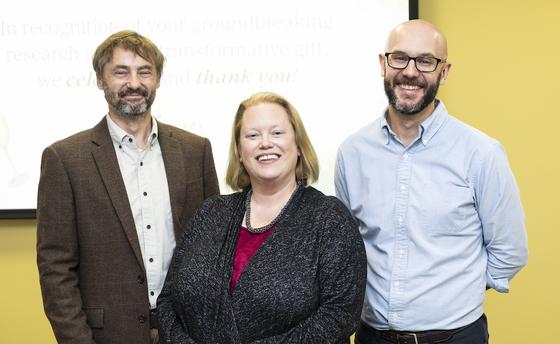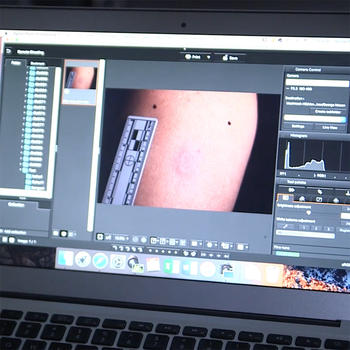George Mason University today announced an anonymous $4.85 million gift to advance groundbreaking research on bruise and injury detection for individuals who experience interpersonal violence.

The funding will help develop new tools in imaging technology using a light source that is five times better than white light for identifying and visualizing bruising across all skin tones for use by forensic nurses, social service providers, and law enforcement.
“This single largest gift to support research in the College of Public Health’s history underscores Mason faculty’s leadership in life-changing work affecting those who experience interpersonal violence,” said Melissa J. Perry, dean of the College of Public Health. “A gift of this magnitude brings transformative resources to Mason’s cross-disciplinary research and collaborative approach that takes ground-breaking research to new heights with the potential for greater use and impact.”
Mason’s acclaimed interdisciplinary research in using Alternate Light Sources for bruise detection, as featured on NBC Nightly News, is led by researchers Katherine Scafide, David Lattanzi, and Janusz Wojtusiak. The funding will expand the team’s bruise detection system that leverages artificial intelligence (AI), imaging and light technologies, forensic reports, and clinical expertise to increase data collection and access to care for trauma victims. The technology can be used across all skin tones and responds to deficits in the identification of physical injuries particularly among people with darker skin tones.

"By improving documentation of physical trauma, we hope to address disparities in clinical care which can lead to improved healthcare for all as well as legal recourse for all survivors of violence," said Scafide, forensic nurse, research leader, and an associate professor of nursing in Mason’s College of Public Health. “This gift expands Mason’s leadership in developing new technologies to empower vulnerable communities.”
One in three women worldwide experience physical trauma at the hands of an intimate partner or stranger. In the United States, more than 10 million women and men grapple with intimate partner violence each year. Among domestic violence survivors, bruises and soft tissue trauma are the most reported injuries. When injuries are accurately documented, survivors are more likely to participate in the criminal justice process, according to recent studies on interpersonal violence and reporting. In addition, family and partner violence and elder abuse can lead to a host of other public health issues, such as infectious and noninfectious diseases, mental health trauma, and reproductive health problems.
"A vital piece to success is ensuring that any AI tool has access to in-depth data from all skin tones and skin characteristics alongside human expert analysis,” said Lattanzi, an associate professor in the Sid and Reva Dewberry Department of Civil, Environmental, and Infrastructure Engineering in the the College of Engineering and Computing.
Supporters working on ending domestic violence commended the announcement.
Ruth Glenn, president of Survivor Justice Action, applauds the groundbreaking work. “In a nation where domestic violence disproportionately impacts communities of color, this innovative research holds immense promise. By prioritizing inclusivity and recognizing the unique challenges faced by survivors with darker skin tones, Scafide’s research aligns seamlessly with our vision to end domestic violence in our lifetime. Continued research on this technology not only has the potential to revolutionize the identification of bruising in diverse populations but also signifies a vital step toward justice and empowerment for those who have long been marginalized. Survivor Justice Action stands firmly in support of initiatives that demand systems change and establish resources for survivors and advocates.”
“The Scafide team’s research and findings are revolutionizing medical forensic examinations. The ability for medical professionals to visualize and identify previously ‘invisible’ injury substantively advances quality medical assessment and patient care. Visibility and documentation of trauma/ injury provide valuable forensic corroboration for law enforcement and the courts to hold offenders accountable,” said Ann Burdges, CEO of End Violence Against Women International.
This project is led by Mason’s College of Public Health in collaboration with the College of Engineering and Computing. More information on the study can be found at bruise.gmu.edu.
Related News
- April 22, 2024
- April 19, 2024
- April 15, 2024
- April 10, 2024
- April 2, 2024
